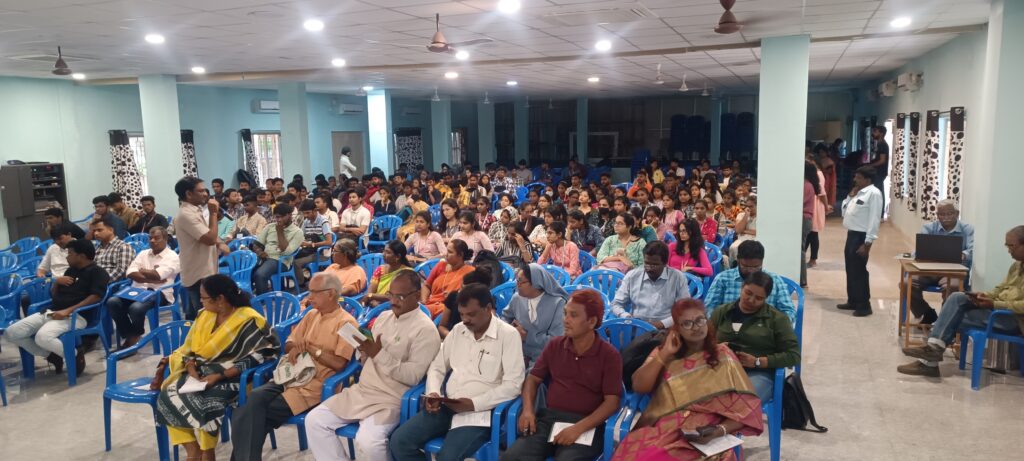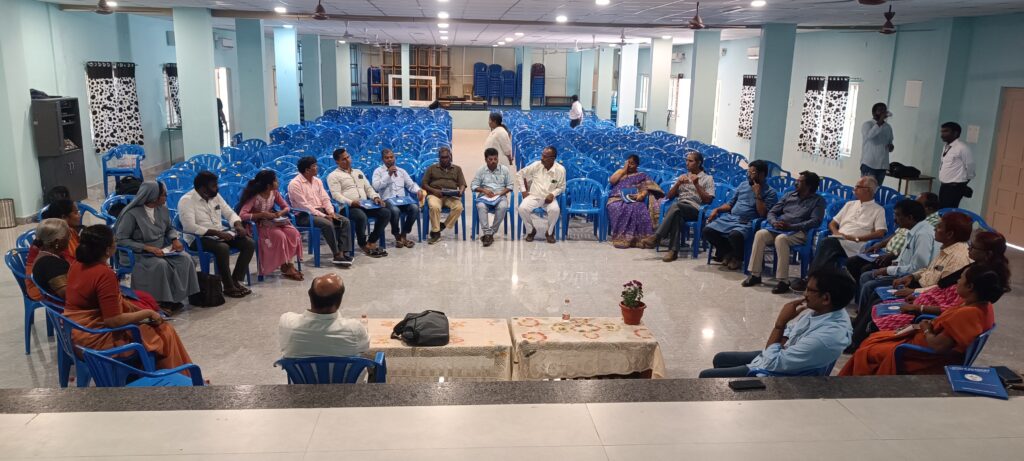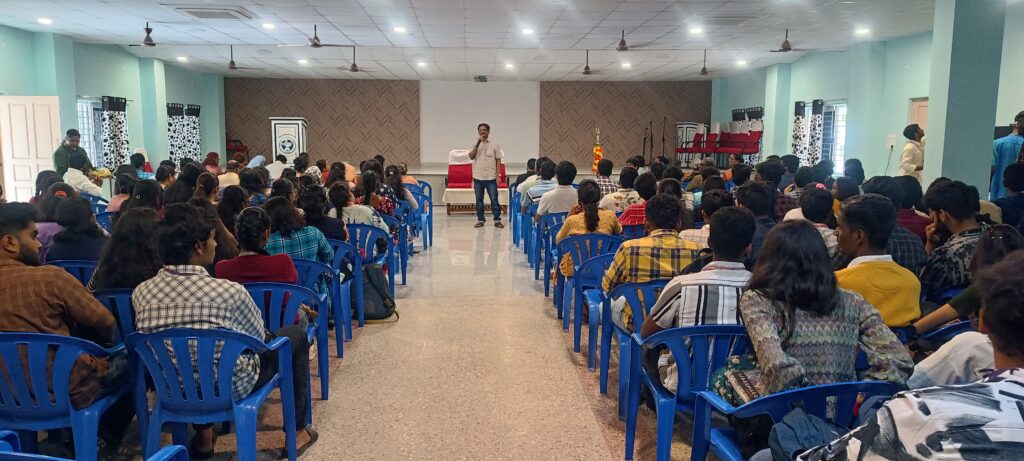


The Indian Social Institute Bangalore (ISI) organised a “Workshop on Legal Literacy” for the NGOs and CSOs working with migrants in collaboration with CITRA (Center for Information, Training, and Research Activities) and Loyola Academy, Secunderabad.
Date: 13th to 15th September 2023
Venue: LOYOLA ACADEMY, Alwal, Secunderabad, Telangana 500015.
Program Overview:
The workshop aimed to provide a comprehensive guide for Non-Governmental Organizations (NGOs) and Civil Society Organizations (CSOs) actively engaged in working with migrant populations. The program was designed to equip participants with essential legal knowledge and practical guidelines, promoting legal literacy, particularly in the context of migrants and anti-human trafficking efforts.
First Day: September 13, 2023
Inauguration: The day started with the timely arrival of all the participants at 10.00 a.m. in Satyodayam. The formal inauguration of the Legal Literacy program occurred in Loyola College campus, Alwal Secunderabad. The inaugural session was graced by Fr. L. Joji SJ, The Principal of the College, Fr. Amar Rao SJ the Rector and Correspondent of the college, Fr. Selvaraj SJ the Director of ISI Bangalore and Fr. Yesurethinam SJ the Director of CITRA. They all spoke about the importance of the workshop and their relevance today. Sri. B. Srinivas Rao, DSP, Anti-Human Trafficking, Women Safety Wing, Hyderabad, served as the chief guest and delivered an hour-and-a-half-long speech. His address explored critical topics such as the trafficking of women and children, the link between poverty and trafficking, and preventive measures. He emphasized the roles of community vigilance, education, and awareness.
Keynote Address: Fr. Selvaraj SJ the Director of the Indian Social Institute (ISI) delivered a thought-provoking keynote address. He provided valuable insights into the history and current state of migration in India, explaining the challenges faced by organizations and individuals working with migrant communities. His address set the tone for the workshop, offering a comprehensive understanding of the context and issues related to distress migration.
After the keynote address, in response to an unforeseen absence of one of the scheduled speakers, organizers conducted a group discussion. This impromptu session enabled participants to explore issues specific to labour migrants.
Session by Priyansha Singh: Ms. Priyansha Singh, COO of Chalo Network, led a session on the financial challenges confronting migrants in India. Her presentation on “Financial inclusion initiatives and methods for migrants in India” emphasized the need for an equitable financial system. Ms. Singh’s expertise prompted a flurry of questions from student participants and she patiently addressed each query. This session exemplified the workshop’s commitment to empower NGOs, CSOs, and stakeholders working with migrants, highlighting the importance of reducing financial disparities and fostering an inclusive financial ecosystem
Take away from the first day of the workshop:
- Interactive Learning: The first day of the seminar encouraged interaction, with participants actively posing questions, seeking clarifications, and engaging in discussions with speakers and peers. This approach enriched the learning experience, fostering shared knowledge and commitment among participants.
- Networking Opportunities: Participants had ample opportunities throughout the day to network and connect with like-minded individuals and organizations dedicated to addressing migrant issues. These moments facilitated exchange of ideas with potential collaborators.
- Time management: Well-timed breaks for coffee, lunch, and tea encouraged the participants to build friendship and to initiate informal discussions. The participants departed the Loyola Academy campus around 5:30 pm. They left with a deeper understanding of the challenges and responsibilities related to migrant issues, setting the stage for the subsequent days of the workshop.
In fact, the first day of the National Seminar not only laid the foundation for the upcoming sessions but also provided diverse experiences and insights. Participants left with a renewed sense of purpose and enhanced capabilities to contribute meaningfully to empower the migrants with well-informed legal provisions.
Second Day: 14th September, 2023
Interactive Student Session: The day started with a session that involved students in the legal literacy workshop. One of the participants a retired principal led this interactive session and effectively conveyed the difficulties of migration to the students. His oratory skills captivated the audience, particularly the students, who became actively involved in the discussion.
Case Study by Mr. Jagadeesh: Mr. Jagadeesh another participant presented a powerful case study to the students, shedding light on their organization’s successful intervention to rescue a girl who had fallen victim to human trafficking. He highlighted the role of social media in luring the girl into danger, raising awareness about the dangers associated with online platforms.
Guest Speaker: The workshop welcomed Sri Nerella Malyadri, a retired District Court judge, to address the participants. While the former judge spoke on issues relevant to students, he did not delve into legal matters extensively. Sr. Mary attempted to engage him in legal discussions, but the speaker chose to follow his own path.
Session by Mr. Sarat Babu: Mr. M. Sarat Babu, District Probation Officer Gr-I in Visakhapatnam, Andhra Pradesh State, led a session on labor laws, employee reimbursement, and legal procedures related to payment of wages. Mr. Sarat Babu explained the complexities of labor laws, employee reimbursement, and potential legal challenges in salary disbursements. His session provided attendees with a comprehensive understanding of these legal aspects, enabling them to navigate labour-related regulations more effectively.
Insight into DLSA by Mr. Kumar: After lunch, Mr. Kumar from DLSA (District Legal Services Authority) provided valuable insights into people’s access to the National Legal Services Authority and its access to ordinary citizens and migrants. He explained the intricacies of DLSA operations. Participants actively posed questions, and Mr. Kumar patiently addressed their queries. Rajini assisted by translating Mr. Kumar’s session when he faced challenges in delivering it in English.
Tea and Photo Session: Following tea break, a photo session was organized with all the participants. Fr. L. Joji joined for tea and photos, which enhanced a sense of community spirit
In the Loyola Hall, a special segment of the day was dedicated to expressing gratitude to the management for their invaluable collaboration. Participants took the opportunity to extend their appreciation for the support provided by the college and other stakeholders. This gesture of gratitude emphasized the significance of collaborative efforts in advancing the workshop’s objectives.
Session by Mr. Aris Mohammad: Mr. Aris Mohammad, one of the Guest Speakers took the stage around 4:30 pm to deliver a lecture on the intersection of migrant workers and elections. This session proved to be highly interactive, fostering discussions and exchange of ideas among participants. Mr. Aris Mohammad’s insights enhanced their perspectives on the complex relationship between migrant workers and the electoral process.
The second day of the workshop was more dynamic and informative, offering diverse perspectives on migration-related issues. Participants benefited from their active involvement in discussions and the valuable insights shared by esteemed speakers. The day’s activities strengthened the collective commitment of the all the participants of the Workshop.
Third Day: 15th September, 2023
Session 1: “Legal Aid to Migrants in Conflict with Law: In Prisons, Police Custody & Juvenile Homes” – By Fr. Dr. Martin SJ
The morning session was facilitated by Fr. Dr. Martin SJ, the Cetral Hub coordinator of MAIN from ISI – Delhi. He made the participants to understand how to provide legal aid to migrants who find themselves entangled in legal conflicts. This session gave them a comprehensive understanding of the challenges migrants face while dealing with the legal system, particularly in prisons, police custody, and juvenile homes. Participants gained valuable insights, legal perspectives, and practical guidance on ensuring the rights of migrants in these challenging circumstances.
After a brief break for coffee, the participants engaged themselves in discussing the points emerged in the morning session. They shared their thoughts and opinions on how to initiate collaboration among them in future.
Session 2: “MAIN (Migrant Assistance and Information Network): Operational Method (Modus Operandi)” – By Rev. Fr. Dr. Martin SJ
Fr. Dr. Martin SJ resumed the second session of the day. During this session he dealt with the operational methods of the Migrant Assistance and Information Network (MAIN). Participants had a broader understanding of MAIN’s functioning, strategies, and approaches to effectively assist migrants. This session enabled them how they could contribute to the networking mission to assist the migrants in distress.
Valedictory and Evaluation
As the day approached its conclusion, a valedictory session was held. The participants reflected on the day’s learnings and achievements. They evaluated the sessions and provided feedback on what they found most valuable and how the workshop could be improved in future.
The workshop came to a conclusion with a vote of thanks, where organizers expressed gratitude to all contributors, speakers, and participants for the success of the workshop. They carried with them not only new legal knowledge but also valuable insights to apply in their work with the migrant communities.
An informal interaction with State Hub Coordinators
This interactive session was designed to foster collaboration and knowledge sharing among participants and MAIN-State Hub Coordinators. It was an opportunity for attendees to connect with the state hub coordinators of MAIN from various regions of India. The participants discussed with them state-specific challenges, opportunities, and initiatives related to migrant assistance. After a sumptuous lunch all the participants departed. We do thank the MAIN state Hub A.P & Telangana and Loyola Academy administration in Secunderabad for their cooperation and collaboration to conduct this workshop on Legal Literacy to all those NGOs and CSOs working for/among the migrants in India. This workshop also gave a greater awareness on the distressed conditions of the migrants among the student community in Loyola Academy campus. The workshop was a mutual enrichment of the Migrant workers, students, and the resource persons. Thanks to one and all.
Reported by Mr. Ananda Rao, Trainer ISI – B & Ms. Rajani, Field staff A.P. MAIN
